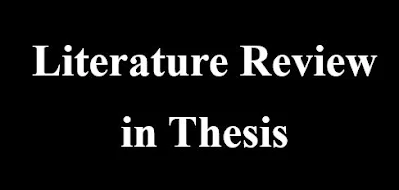Literature Review:
Objectives of a literature review:
1.Identify the knowledge frontier and what needs
to be studied.
2.Identify the context of research question.
3.Identify key words, variables linking to your research question,
and their potential relationships.
4.Establish the relationships between theoretical frames on one
part and empirical consideration on the other.
5.Having those goals in mind, and with the
evolution of technology, we will present you some powerful tools.
6.Some to collect the references, others to
aggregate it, and finally to produce a good framework to present your
references in an article.
How to find references:
1-
The easiest way is to
use Google Scholar with keywords. But even for this tool, you need to have
in mind some principles.
2-
Indeed, if you don't
clear on how to look for references, you will be drowned by references in
a few minutes.
3-
Then, the first work
is to translate your subject in few keywords.
4-
And then use a two by
two on Google Scholar. Otherwise, you will have two general references or
two specialized ones.
Let's take an example:
1-
How educational
training improve your wage and the labor market.
Economists call it the rate of return of
education. And we can wonder if each year of education as the same
impact.
Then how should I begin my research?
First, let's go on Google's Scholar which is
quite easy.
There is no difficulty here.
· Then we just put our keywords that we just
talked about, and then let's begin with education and returns.
· Then you can see all the references proposed
by Google on several pages.Of return like in standard research in Google. And
then the first article proposed.
· It's called Education Return Approach Consider
of the Wage.
·
You can see the
authors, Mwabu and Schultz, the journal where it was published, the
American Economic Review, the year, 1996,
· and the dataset where it is stored which is
JSTOR.
· Just below, you can see the beginning of the abstract.
And then the important information, the amount of time which is cited. When you
click on it, you will see all the article who referred to the previous one
which is quite useful because sometimes you need to go deep on some
concepts of your visual graphs.
· Finally, you have several option on the left
of the page.
·
Most important, you
have the possibility to create an alert which will send you an email when
new references appears with those specific key words.
·
You can select a
specific here to focus on the other references, or on the contrary,
unselect this one. And you can select a specific language
· which allow you to go on the specific
research.
·
Be aware that keywords
are not neutral.
·
They frame the way one
looks at one's question research.
·
To get out of this
biased way of thinking, it is useful to try and define new keywords until
you deem your research complete concerning the ones you already
defined.
·
To identify new
keywords, you can think of all concepts, disciplines, problem that can be
linked to your first keywords.
·
Then during your
references researchers,
·
you discover journals
publishing specifically on your fields of interest.
·
Then do not forget to
do some research on their website directory.
· You find the author, take a look to his
website too.
· Moreover, the text is also the
handbooks,
which aggregate articles of a specific
concept.
· You can see it as meta-bibliography.
·
More specific than the
journal, but of course it will not be the exact same as yours.
·
There is also review
papers, for instance chemical review, that can give you very important
information under subjects you are interested in.
·
Finally, be careful
not to get lost in the return of review.
·
Often, first year PhD
student gets lost in doing some bibliographical review of their field and
don't even work on the subject.
·
Be wise and manage
your time.
· Now that you have found articles, you want to
store it.
· Then you can begin to read an article.
·
But do not forget that
you will not have the time to read again and again and again all your articles
to find the specific information when it will be the time to write.
·
Let's say it's
three years later for instance.
·
Then you need to take
notes from your readings.
·
The easiest way is to
use a table to note at least the following information, the authors, the
date, the full reference, the problematic, the used thesis,
methodology,
quote directly from the article, and your personal idea about
this article.
These are just advice fitting my own research field.
·
In an area with more
mathematical content, you might want to add a mathematical expression
column for instance.
·
You can think about
other columns to fit your field.
· This is it for the computer tools. Now
you have to practice it. Hope you find it useful advice.



.jpeg)
.jpeg)

0 Comments